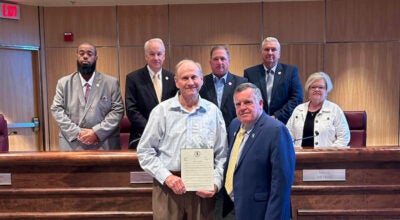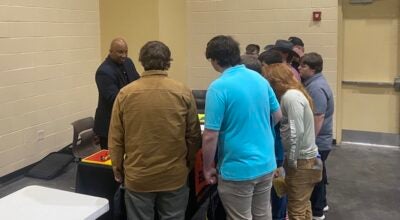Public Health urges residents to take precautions during cold weather
Published 5:06 pm Thursday, February 26, 2015
The Alabama Department of Public Health urges residents to take extra precautions during times of extremely cold weather. When exposed to cold temperatures, our bodies begin to lose heat faster than it can be produced, according to a release from the Alabama Department of Public Health. This results in abnormally low body temperature called hypothermia.
Hypothermia occurs when the body’s core temperature falls below 95 degrees, just a few degrees less than the normal body temperature.
Hypothermia makes people unable to think clearly or move well.
Most hypothermia victims are older adults, the release said.
As the body ages, its ability to maintain a constant internal temperature decreases. Hypothermia risk is even greater when an older person has a chronic condition that affects the circulatory or neurologic systems, or the thyroid. When the core temperature falls, bodily functions shut down.
Knowing what to do in cold weather can help prevent hypothermia.
To provide protection, older adults’ living quarters should be heated to at least 65 degrees, they should wear suitable clothing, have plenty of warm blankets available, and eat nutritionally balanced food.
Check on elderly neighbors, friends, and relatives to make sure they are keeping warm and discourage them from going outside if it is cold, especially if it is windy or wet.
In addition to advanced age, common risk factors for hypothermia are substance abuse and mental impairment.
Certain commonly used drugs such as tranquilizers may contribute to the onset of hypothermia. Furthermore, many deaths from hypothermia are complicated by alcohol consumption, which can lead to dehydration and impaired judgment. Everyone should remember to lower risks of cold-weather health problems and follow these recommendations:
·Dress in multiple layers to help retain body heat.
·Limit time outdoors, and remove wet clothing immediately.
·Watch for signs of hypothermia in babies, people drinking alcohol, and others.
·Call for emergency help immediately if you suspect someone has hypothermia, and keep the victim warm until assistance arrives.
Generator safety
During times of power outages following winter storms, many people use items that can produce carbon monoxide. Exposure to carbon monoxide can cause flu-like symptoms and ultimately lead to coma and death. Exposure to odorless, colorless carbon monoxide is responsible for more fatal unintentional poisonings in the United States than any other agent.
If a generator is used, be sure to follow these safety tips:
·Have a carbon monoxide monitor with fresh batteries in it and place it in the house high on a wall. Carbon monoxide is lighter than air and rises towards the ceiling.
·Place generators as far away from the home as possible. People have had carbon monoxide poisoning from generators as far away as 30 feet away from the house.
·Never hook up the generator to the home’s normal wiring. Improper wiring of a home generator can create back feed in the electrical wires to the house and could injure or kill utility workers repairing the electrical lines.
Many risks are associated with the use of fuel-burning appliances in enclosed or semi-enclosed areas. These include camping stoves, portable propane gas stoves and charcoal grills used in enclosed or semi-enclosed spaces. The fumes are deadly.
Here are some other tips:
·Do not use a generator or appliances if they are wet.
·Do not store gasoline indoors where fumes could ignite.
·Use individual heavy-duty outdoor-rated cords to plug in other appliances.
·Do not turn on a stove for heat; it is not safe.
·Never place a space heater on top of furniture or near water.
·Never leave children unattended near a space heater.
·Keep heat sources at least three feet away from furniture and draperies.
Food safety
As a general rule, a full upright or chest freezer will keep foods frozen for about two days without power. A partially full freezer will keep foods frozen for about one day.
This time may be extended by keeping the door shut.
A refrigerator will keep foods cool for 4-6 hours if the door is kept shut as much as possible.
Discard any thawed foods that have been at room temperature for more than two hours.
Foods still containing ice crystals can be refrozen, although the quality may decrease.
Foods that have thawed to refrigerator temperatures can also be cooked and then refrozen.
For specific questions about a food or refrigeration condition, contact your local county health department or the Food Safety and Inspection Service’s Meat and Poultry Hotline at (800) 535-4555.
For more information on injury prevention, please visit the Alabama Department of Public Health at www.adph.org.






